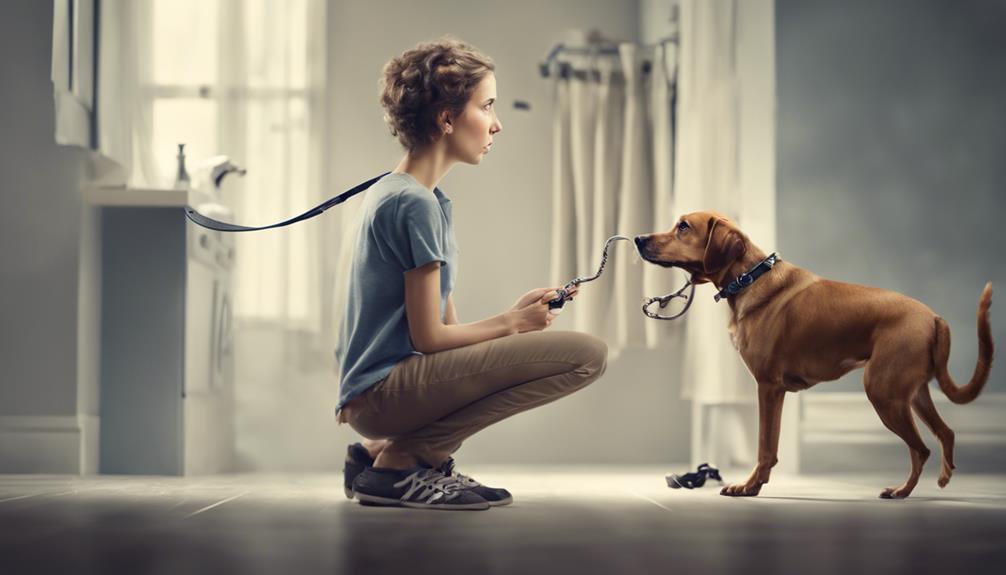Did you know that a whopping 63% of people in the United States who have pets consider them as part of the family? As devoted pet parents, our top priority is ensuring the happiness and health of our beloved dogs. Choosing the perfect dog daycare is crucial in providing a secure and enjoyable setting for your furry friend. Whether you have a hectic schedule or require occasional pet care, a dog daycare facility can offer the best care for your four-legged companion. Don’t miss out on the opportunity to give your dog the best experience possible!
Choosing the right dog daycare can be an overwhelming task, considering the various options available and the well-being of our furry friends at stake. That’s why we’ve put together the ultimate dog daycare guide for pet parents like you. In this comprehensive guide, we’ll cover the benefits of dog daycare, factors to consider when choosing a daycare, questions to ask potential providers, red flags to watch out for, and personal experiences to help you make an informed decision.
Key Takeaways:
- Choosing the right dog daycare is essential for the well-being of your furry friend
- Dog daycare offers benefits such as socialization, mental stimulation, and physical exercise
- Factors to consider include location, cleanliness, staff qualifications, and playgroup size
- Asking specific questions ensures the daycare meets your dog’s needs
- Watch out for red flags such as lack of transparency and negative reviews
The Benefits of Dog Daycare
When it comes to taking care of our beloved furry friends, dog daycare proves to be a game-changer. Not only does it provide a safe and supervised environment for dogs, but it also offers a range of benefits that go beyond basic care.
Socialization:
Socialization plays a crucial role in a dog’s overall well-being. Dog daycare provides ample opportunities for dogs to interact with other dogs and experienced caregivers, fostering the development of vital social skills. Through positive interactions and supervised playtime, dogs learn how to communicate effectively, recognize boundaries, and build confidence in various social settings.
Our furry friends thrive on companionship and enjoy being part of a pack. Dog daycare enables them to form new friendships and learn from their canine peers. This socialization experience helps prevent behavioral issues, such as aggression or separation anxiety, by instilling a sense of comfort and adaptability in dogs.
Mental Stimulation:
Nothing keeps our dogs happier than an engaged and stimulated mind. Dog daycare offers a wealth of mental stimulation activities that keep our furry friends mentally sharp and satisfied. The structured play sessions, sensory experiences, and puzzle toys provided at daycare facilities challenge dogs’ cognitive abilities and keep them entertained throughout the day.
The expertise of caregivers, combined with an array of toys and games, ensures that dogs receive the mental stimulation they need to thrive. This stimulation helps prevent boredom, which can lead to destructive behaviors or excessive barking when left alone at home. By keeping their minds actively occupied, dog daycare sets the stage for a healthier and happier lifestyle.
Physical Exercise:
Engaging in regular physical exercise is vital for the overall health and well-being of our furry companions. Dog daycare understands the importance of keeping dogs physically active and provides them with ample opportunities to burn off energy in a controlled environment.
At daycare facilities, dogs can enjoy supervised playtime, structured exercise routines, and interactive games that cater to their individual needs. Whether it’s running, fetching, or agility exercises, the physical activities offered at dog daycare help dogs stay fit, maintain a healthy weight, and improve their cardiovascular health.
| Benefits | |
|---|---|
| Socialization | Developing vital social skills, preventing behavioral issues |
| Mental Stimulation | Engaging activities, sensory experiences, puzzles |
| Physical Exercise | Supervised playtime, structured exercise routines |
The combination of socialization, mental stimulation, and physical exercise provided by dog daycare ensures that our furry friends lead balanced and fulfilling lives. From socializing with their peers to engaging their minds and keeping their bodies active, dog daycare offers benefits that go far beyond basic care.
Factors to Consider When Choosing a Dog Daycare
When it comes to selecting the right dog daycare for your furry friend, there are several important factors to take into consideration. Making an informed decision is crucial to ensure that your dog will be happy, safe, and well-cared for during their time at daycare. Below, we have outlined the key factors that should guide your decision-making process.
Location and Convenience
Choosing a daycare facility that is conveniently located to your home or workplace is essential. Consider the distance you will need to travel and the ease of drop-off and pick-up. Opting for a daycare that is close by can save you valuable time and reduce stress for both you and your pup.
Facility Cleanliness and Safety Measures
A clean and safe environment is vital for your dog’s health and well-being. When visiting potential daycares, pay close attention to the cleanliness of the facility, including the play areas, restrooms, and grooming areas. Ask about their cleaning protocols, and ensure that they have proper safety measures in place to prevent accidents and injuries.
Staff Qualifications and Experience
The qualifications and experience of the daycare staff are crucial considerations. Look for facilities that employ trained and knowledgeable caregivers who are experienced in handling dogs of different sizes, breeds, and temperaments. The staff should be able to provide appropriate care, offer guidance, and address any concerns that may arise.
Playgroup Size and Temperament
The size and temperament of playgroups can significantly impact your dog’s daycare experience. Evaluate whether the daycare separates dogs based on size, age, or temperament to ensure a safe and comfortable environment for your furry friend. Smaller playgroups may be ideal for dogs who prefer a quieter and calmer atmosphere, while larger groups may offer more socialization opportunities.
By considering these factors, you can narrow down your options and select a dog daycare that meets your dog’s unique needs. Remember, visiting and observing the facility firsthand, asking questions, and trusting your instincts are essential steps in finding the perfect daycare for your beloved canine companion.

Questions to Ask Potential Daycare Providers
When searching for the right dog daycare for your furry friend, it’s crucial to ask potential providers specific questions to ensure they can meet your dog’s unique needs. Here are some important questions to consider:
- What are your vaccination requirements?
- Do you have a daily routine for the dogs?
- What types of activities are included in the daily routine?
- How do you handle emergencies? What are your emergency protocols?
Asking about vaccination requirements is essential to guarantee the safety and health of all dogs in the daycare. It ensures that your dog will be surrounded by other vaccinated and healthy dogs, minimizing the risk of contagious diseases.
Understanding the daily routine offered by the daycare is crucial to ensure your dog will have a structured and engaging day. You want to make sure they’ll have opportunities for exercise, mental stimulation, and socialization, as these are essential for a dog’s overall well-being.
Lastly, it’s vital to inquire about the daycare’s emergency protocols. Accidents can happen, and it’s important to know that the staff is trained to handle emergencies promptly and efficiently.
By asking these questions, you can gain valuable insights into the daycare’s practices, ensuring a safe and enriching environment for your beloved pet.
“Understanding the daily routine and emergency protocols of a dog daycare is crucial to ensure your dog’s safety and well-being.”
“`html
| Questions to Ask Potential Daycare Providers |
|---|
| What are your vaccination requirements? |
| Do you have a daily routine for the dogs? |
| What types of activities are included in the daily routine? |
| How do you handle emergencies? What are your emergency protocols? |

Asking potential daycare providers the right questions will help you make an informed decision and choose a daycare that aligns with your dog’s needs.
Red Flags to Watch Out For
When researching potential dog daycares, it’s essential to keep an eye out for red flags that may indicate a lack of transparency or compromise the well-being of your furry friend. Being aware of these warning signs can help you make an informed decision and ensure your dog’s safety and happiness. Some common red flags to watch out for include:
- Lack of Transparency: A reputable dog daycare should be open and transparent about their policies, procedures, and the daily activities they provide for the dogs. If a daycare is evasive or doesn’t provide clear information, it could be a sign that they have something to hide.
- Overcrowded Facilities: Overcrowding can lead to stress and anxiety for dogs. If the daycare facility you are considering appears to be overcrowded or has a high dog-to-staff ratio, it may not be able to provide the individual attention and care your dog needs.
- Negative Reviews or Experiences: Pay attention to the experiences shared by other pet parents. Negative reviews or complaints about the daycare’s services, staff, or facilities should be taken seriously and considered when making your decision.
Remember, trust your instincts. If something feels off or doesn’t sit right with you, it’s important to explore other options. Your dog’s well-being should always be the top priority.

| Red Flag | Description |
|---|---|
| Lack of Transparency | The daycare is unwilling to provide clear information about their policies, procedures, and daily activities. |
| Overcrowded Facilities | The daycare has too many dogs in one space or a high dog-to-staff ratio, which may lead to stress and compromised care. |
| Negative Reviews or Experiences | The daycare has a history of negative reviews or complaints from other pet parents regarding their services, staff, or facilities. |
Introducing Your Dog to Daycare
When it comes to introducing your dog to daycare, a gradual approach and positive reinforcement are key. Taking the time to acclimate your furry friend to the new environment, staff, and other dogs will ensure a smooth transition and a positive experience for everyone involved.
Start by scheduling shorter visits to the daycare facility, allowing your dog to become familiar with the surroundings and the caregivers. These initial visits will help them build confidence and establish a sense of security in the new environment.
During these visits, observe your dog’s behavior closely. Look for signs of stress or discomfort, such as excessive panting, pacing, or avoiding interaction with other dogs. If you notice any signs of distress, it may be necessary to slow down the introduction process further or seek guidance from a professional dog trainer.
Gradual Introductions
As your dog becomes more comfortable during their daycare visits, gradually increase the duration of their stay. This allows them to acclimate to the longer hours they may spend at daycare when you are away.
Additionally, consider introducing your dog to different playgroups with varying sizes and temperaments. This exposure will help them learn to interact with a diverse group of dogs, preparing them for different social situations.
Remember to always prioritize your dog’s well-being and monitor their stress levels throughout the introduction process. Each dog is unique, and some may require more time and patience to adjust to the daycare setting.
“Taking the time to introduce your dog to daycare gradually can make a world of difference in their overall comfort and enjoyment. It’s important to be patient and trust the process.”
Using positive reinforcement techniques is vital during the introduction period. Reward your dog with praise, treats, or their favorite toy for calm and positive behavior while at daycare. This positive association will help them associate daycare with positive experiences.

Tips for a Successful Introduction:
- Choose a reputable daycare facility that prioritizes the safety and well-being of all dogs.
- Inform the daycare staff about any specific needs or concerns your dog may have.
- Provide detailed information about your dog’s vaccination history to ensure they are up-to-date.
- Follow the daycare’s guidelines and policies regarding drop-off and pick-up times.
By taking a gradual approach, providing positive reinforcement, and closely monitoring your dog’s progress, you can help them have a positive and enriching experience at daycare. Remember, every dog is unique, so trust your instincts and work closely with the daycare staff to ensure a smooth transition.
Why Doggy Daycare Evaluations Are Important
When it comes to choosing the right doggy daycare for your furry friend, evaluations play a crucial role. These evaluations not only ensure the compatibility of dogs with other dogs and people at the facility but also help identify any fear or aggressive behaviors that need to be addressed. Let’s explore why doggy daycare evaluations are so important.
Temperament Testing
During doggy daycare evaluations, trained professionals conduct temperament testing to assess each dog’s behavior and personality traits. This test helps determine the dog’s ability to socialize and interact with other dogs in a safe and controlled environment. By understanding the temperament of each dog, daycare providers can create compatible playgroups and ensure a positive experience for all dogs involved.
Energy Levels
Another important aspect evaluated during these daycare assessments is the energy levels of the dogs. Understanding each dog’s energy level is crucial in ensuring that they are placed in playgroups with other dogs who have similar energy levels. This helps prevent any misunderstandings or conflicts that may arise due to a significant difference in energy levels.
“Doggy daycare evaluations are essential in determining the right playgroup for each dog, considering factors such as size, age, and energy level. It ensures their safety and enjoyment throughout their time at daycare.”
Identifying Fear or Aggressive Behaviors
One of the primary purposes of doggy daycare evaluations is to identify any fear or aggressive behaviors in dogs. By closely observing their interactions, professionals can detect any signs of fear, anxiety, or aggression that may pose a risk to other dogs or staff members. Identifying these behaviors allows pet parents and daycare providers to work together on socialization techniques and develop strategies to address and manage any behavioral concerns.
By prioritizing doggy daycare evaluations, pet parents can be confident that their furry friends will be placed in a safe and suitable environment. These assessments ensure the compatibility of dogs, create harmonious playgroups, and provide an opportunity for dogs to grow socially and emotionally.

Choosing the Best Doggy Daycare Facility
To ensure your furry friend receives the best care and attention, it’s crucial to choose the right doggy daycare facility. When making this important decision, consider the following factors:
- Facility Visits: If possible, visit several daycare options in person. This allows you to assess the environment, observe how staff interacts with the dogs, and get a feel for the overall atmosphere.
- Surface Sanitization: Look for a facility that prioritizes cleanliness and maintains sanitizable surfaces. This helps prevent the spread of germs and ensures a safe and healthy environment for all dogs.
- Licensed Facility: It’s essential to choose a daycare that is licensed and meets all necessary legal requirements. This guarantees that the facility adheres to regulations and maintains a high standard of care.
By considering these factors during your selection process, you can make an informed decision and choose a doggy daycare facility that provides a safe, clean, and enjoyable environment for your beloved pet.

Tips for Selecting a Doggy Daycare
When it comes to selecting a doggy daycare for your furry friend, there are several important factors to consider. Ensuring that your dog receives the best care and attention requires careful evaluation of the location, cleanliness, playgroups, daily schedule, vaccination requirements, and reviews from other pet owners.
Evaluating the Location
The location of the doggy daycare is an essential factor to consider. Look for a facility that is conveniently located near your home or workplace, making drop-offs and pick-ups more convenient for you.
Emphasizing Cleanliness and Safety
“Cleanliness is next to dogliness.”
When visiting potential daycare facilities, pay close attention to cleanliness standards. Look for clean and well-maintained play areas, properly sanitized equipment and toys, and overall hygienic practices being followed by the staff. A clean and safe environment is crucial for your dog’s health and well-being.
Understanding Playgroup Dynamics
Dogs are social creatures, and proper playgroup dynamics are essential to their experience at a daycare facility. Inquire about the playgroup sizes and how they are structured. It’s important to ensure that dogs are grouped according to their temperament, size, and energy level. This will help ensure a positive and safe play environment for your dog.
Reviewing the Daily Schedule
Ask the daycare facility about their daily schedule for the dogs. A well-planned and structured schedule should include ample playtime, rest periods, supervised activities, and individual attention. Knowing how your dog’s day will be structured will give you peace of mind, knowing that they will have a fulfilling and enjoyable experience.
Checking Vaccination Requirements
Vaccination requirements are crucial to maintain a healthy and safe environment in a doggy daycare. Ask the facility about their vaccination policy and ensure that all dogs in the facility are up to date on their vaccinations. This helps prevent the spread of diseases and ensures the well-being of all dogs in attendance.
Reading Reviews from Other Pet Owners
“We all bark together!”
One of the best ways to gauge the quality of a doggy daycare is by reading reviews and testimonials from other pet owners. Their firsthand experiences can provide valuable insights into the facility’s reputation, level of care, and overall customer satisfaction.
| Location | Cleanliness | Playgroups | Daily Schedule | Vaccination Requirements | Reviews |
|---|---|---|---|---|---|
| Convenient and easily accessible location | High standards of cleanliness and hygiene | Well-structured playgroups based on temperament and size | Structured daily schedule with playtime and rest periods | Strict vaccination requirements for all dogs | Positive reviews from satisfied pet owners |

Conclusion
Choosing the right dog daycare is crucial for the overall well-being of your furry friend. As pet parents, we understand the importance of finding a daycare that meets all their needs. By following the guidance provided in this dog daycare guide, you can make an informed decision that aligns with your pet’s requirements.
Remember, the key to choosing the right daycare is considering the essential factors discussed in this guide. Think about the location, cleanliness, playgroups, daily schedule, vaccination requirements, and reviews from other pet owners. Your thorough research and attention to detail will lead you to the perfect daycare for your beloved companion.
As you embark on the journey of choosing a dog daycare, trust your instincts. Take the time to visit the facilities, ask the right questions, and observe how the staff interacts with the dogs. Your pet’s happiness and well-being should always be at the forefront of your decision-making process.
We hope this guide has provided valuable insights into the world of dog daycare and has empowered you to make the best choice for your furry friend. Remember, choosing the right daycare is an investment in their happiness and ensures they receive the love, care, and socialization they need to flourish.










